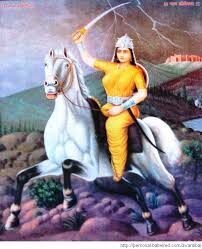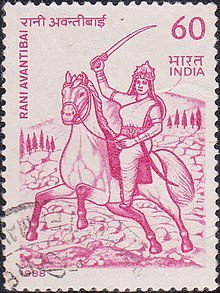Rani Avantibai The roaring Rajputana Queen of Ramgarh
- Ancient history Asian history
 Sneha Shastri
Sneha Shastri- November 15, 2022
- 0
- 1264

The Rajputs are known for their strength and valor and have contributed to Indian heritage since their first generations. Avantibai was a Rajput queen. She was well known for her stance against the British during the revolt of 1857.
“The Rajput queen she was, elegant and brave,
Avanti- for beauty and grace stands her name.”
Avanti was born to a Lodhi, Zamindar family on August 16, 1831. She was very independent since her childhood. She was given training in horse riding, sword fighting, and military strategies. She had expertise in warfare planning and diplomacy. Her charisma was widespread across the Narmada valley. At 18, she was married to Raja Vikramaditya Lodhi of Ramgarh.

When her husband grew too ill to rule the kingdom it was Avantibai who took a firm step and took over the rule. The British did not approve of this. They also didn’t recognize their sons Aman Singh and Sher Singh as heirs because they were minors. Since the Britishers thought that Avanti Bai and her sons were incompetent they decided to install their administration in Ramgarh with respect to rules of the doctrine of lapse. According to doctrine of lapse if a ruler is incompetent or died without a male heir to the throne then the British shall take over their kingdom.
On 13 September 1851, Ramgarh was declared the Court of Wards with a British-approved administrator – Sheikh Mohammad – installed in place. This decision was deeply condemned by Rani Avantibai. Insulted by this act of the British East India Company, she stayed put until she could retaliate.
After the king’s death in 1857, she found the perfect opportunity to respond to foreigners. She had the administrator thrown out of the kingdom and declared war upon British rule.

By May 1857, the news about a rising revolt had spread like wildfire. Villagers started preparing for war, the entire subcontinent was triggered listening to the stories of rifles having cartridges made of cow and pig skin. Rani Avantibai decided to send her own message around. A handwritten note and set of bangles were sent all around. The note said, “if they had any semblance of loyalty or honour towards their country, they would pick up arms and fight – or they could sit at home and wear those bangles.”
Things took serious turns and the lives of people and kings were at threat. Now people from Avantibai’s region wanted her to be the leader of their armed rebellion. She then led an army of 4000 people.
Rani Avantibai took her army to Kheri near Mandla. There she fought fiercely against the British soldiers. The British were ignorant and thought they would obtain an easy win over a widow and her army. But fate had other plans instore for them. They were humiliated by the defeat yet they could not help but go back. Avantibai ruled Mandla till 1858.
The british returned and they returned stronger. They set Mandla on fire so avantibai had to seek refuge in the hilly forests of Devharigarh. Yet she did not give up. She utilized the techniques of guerrilla warfare and also raided General Waddington’s camp. Unfortunately, she was caught by the British. She decided to sacrifice herself rather than fall into the hands of British. Her last words were “remember Rani Durgavati never let the British lay hands on her”.

Rani AvantiBai still lives through folklore and legends across states of North India. She is remembered in the song of the Gond people as,
“The Rani who is our mother, strikes repeatedly at the British. She is the chief of the jungles. She sent letters and bangles to other (rulers, chieftains) and aligned them to the cause. She vanquished and pushed the Britishers out, in every street she made them panic, so that they ran away wherever they could find their way. Whenever she entered the battleground on horseback, she fought bravely and swords and spears ruled the day. O, she was our Rani mother.”
The Bargi dam project in Jabalpur is named in her honour. The Indian post also issued two stamps in her honour on 20 March 1988 and on 19 September 2001. She is given a mention in the NCERT textbooks as a contributor in the revolt of 1857.
It is our duty to cherish the contributions of our ancestors, kings and queens. The life we live today is a fruit of their toil. Rani Avanti Bai was one such queen who sacrificed her life for India’s freedom. During her rule, people lived in peace and prosperity. This was the story of Rani Avantibai Ramgarh- The roaring Rajput queen.



